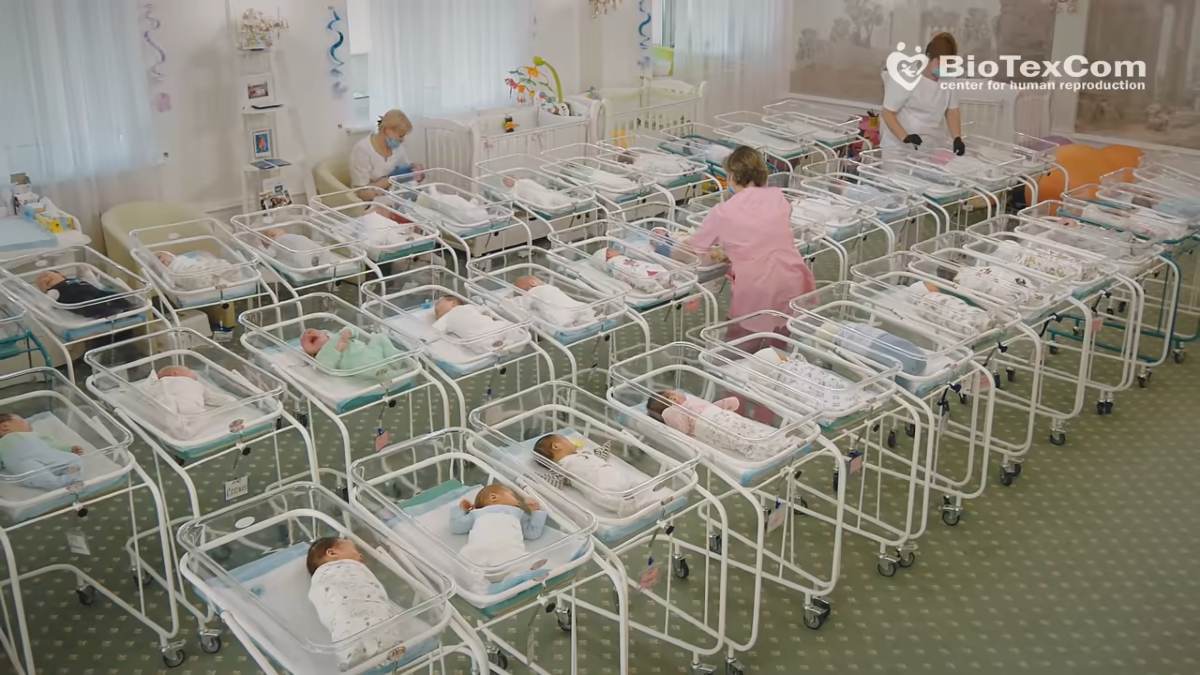Table of Contents
Michael Cook
mercatornet.com
Michael Cook is the editor of MercatorNet. He lives in Sydney, Australia.
Despite their country’s vicious war with Russia, surrogacy agencies in Ukraine are still accepting clients. An article in Toronto’s Globe and Mail paints a picture of near-normality for the agencies. In fact, the burden of government paperwork has been reduced. Before the war, couples might have to spend a couple of months in Ukraine; now they can pick up their baby and leave within a few days.
As conditions in Ukraine worsen, it seems that more women are willing to be surrogates – just to survive. More than 30 per cent of the employable population lack jobs – and women are often the first to be fired. “I need to raise my children, I need to feed them and the war is taking money not giving,” one woman told the Globe and Mail.
BioTexCom is the largest surrogacy company in Ukraine; various publications estimate that it handles two-thirds of the foreign couples seeking a child. In a video on its website its owner, Albert Tochilovsky, says that they are open for business.
Ukrainian fertility clinics tell journalists that they are focused on saving the frozen embryos. “Russian troops have killed not only our soldiers and civilians, they have killed future babies as embryos,” says Dr Valery Zukin, of the Nadiya Clinic in Kyiv. “We’re trying to save not only our soldiers and our citizens—we are trying to save future citizens and future babies.” In eastern Ukraine, there are reports that fertility clinics and their frozen embryos, eggs and sperm have been destroyed. Dr Zukin told Women’s Health magazine that his clinic is caring for 19,000 frozen embryos. Some clinics have run out of the liquid nitrogen which preserves the embryos.
Even in the midst of the calamity of war, foreign couples think more about shopping for a baby than about the welfare of the surrogate mother. “It’s weird, but people still think that it’s normal and they want to have a normal course and they are very surprised when it’s not,” says Julia Osiyevska, the owner of New Hope agency in Kyiv.
A women’s rights activist in Ukraine, Maria Dmytriyeva, told The Globe and Mail that foreign couples who hire surrogate mothers under wartime conditions are just “vultures”.
But arguably the biggest vultures of all are the surrogacy agencies. Since the Kyiv-based IVF clinic BioTexCom is the probably the largest such agency in the world, its owner’s thoughts about the future of assisted reproduction are worth recording. In 2019, Albert Tochilovsky was interviewed by a Ukrainian website. The text has been translated and posted on the BioTexCom website. It has probably never appeared on a website outside Ukraine.

Mr Tochilovsky’s plans for surrogacy and artificial reproduction are ambitious. He says there that the three most dynamic trends in his line of work are genome editing to produce designer babies; mitochondrial replacement to enable women in their 50s and 60s to become pregnant; and ectogenesis, or artificial wombs – which would do away with the need for mothers altogether.
I think that we will acquire ectogenesis within 5-7 years, and our clinic keeps working in this direction. I doubt, though, that Ukraine will let us do something like that because Ukraine is afraid of everything. Most likely, ectogenesis will be allowed in the mentioned above America and Great Britain. The problem of urbanization is pressing there, while only 2% of the population is involved in agriculture. This is a highly developed society, where women build their careers before they reach the age of 40-45, after that they want to have children. Nowadays, immigrants help to solve this issue. I believe, in future this problem will be solved through the use of ectogenesis and mitochondrial replacement.
The interviewer responds that there are serious ethical objections to ectogenesis. Mr Tochilovsky responds that many industries, even automobiles, the banking system, and marijuana were severely criticised in the beginning. He compares advanced reproduction to Germany’s huge sex industry:
You know, once Beate Uhse started the sex industry, she opened the world’s first sex shop. Needless to say that society opposed immediately, and she became an enemy number one. She fought against this attitude. Then the sex industry began producing more money than agriculture. Now Beate Uhse is an esteemed entrepreneur and a public person.*
The industry of the future, he says, is biotechnology. The world is facing a serious demographic crisis and will need fertility technology to ensure that there will be enough people. “A revolution will take place in biology in the nearest future. We will live longer, for 300 and 500 years. And better, as well. At first, this technology will be madly expensive, but then the cost will decrease tenfold. The question is who’s going to be the first in these technologies.”
And Ukraine could be well-placed to take advantage of these trends – if the government realises that the future lies in fertility and not in agriculture. (The interview took place before the current war with Russia.) Ukraine’s competitive advantage, he argues, is lack of regulation and lack of ethical concerns.
* Beate Uhse-Rotermund was a well-known figure in Germany. In 1999, her company, Beate Uhse AG, was listed on the German stock exchange. The Beate Uhse Erotic Museum in Berlin was open from 1996 to 2014. In 1989 she received the Federal Cross of Merit. She died in 2001 at the age of 81.









